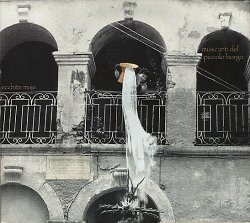Ecchite Maje - May has come
RadiciMusic Records RMR 127
1. tarantella; 2. 'ndndrinella; 3. ecchite maje; 4. fronna e canf pe' Musicant; 5 figliola che stai'ncoppa; 6. eldokapile; 7. auadritara; 8. ritomo dalla transumanza; 9 la figlia meia; 10. pastorale per Gaspare e Rodolfo.
 This is an interesting record - and a good one, too. The band, and the songs and tunes, come from Italy's smallest regione, Molise, which lies on Italy's eastern, Adriatic, coast, between Abruzzo to the north and Apulia to the south - just above the 'spur' of Italy's 'boot'. The booklet notes say that Molise is 'too small to have a full musical identity, but too strong not to choose one and express it with intensity and decision.' I'm not sure that I can agree with such a sweeping statement, but certaily Molise has drawn much musical inspiration from its southern neighbours in Apulia and Campania. Further, the culture has been enriched by immigration from across the Adriatic - a couple of the songs on this CD are sung in Albanian, though they were collected in Molise.
This is an interesting record - and a good one, too. The band, and the songs and tunes, come from Italy's smallest regione, Molise, which lies on Italy's eastern, Adriatic, coast, between Abruzzo to the north and Apulia to the south - just above the 'spur' of Italy's 'boot'. The booklet notes say that Molise is 'too small to have a full musical identity, but too strong not to choose one and express it with intensity and decision.' I'm not sure that I can agree with such a sweeping statement, but certaily Molise has drawn much musical inspiration from its southern neighbours in Apulia and Campania. Further, the culture has been enriched by immigration from across the Adriatic - a couple of the songs on this CD are sung in Albanian, though they were collected in Molise.
The Musicanti del Piccolo Borgo are not so much different from many other modern Italian bands - in that they play a variety of instruments extremely well, and are fronted by a couple of brilliant singers. What makes them rather different is the fact that they don't seem to have 'mucked about' with the tradition too much. The trait they exhibit most obviously is their choice of unusual chords in their instrumental backings to the songs. ![]() This can be heard very clearly on the title track, Ecchite Maje, as can the quality of the two principal singers, Marika Spiezia and Stefano Tartaglia (sound clip). Ecchite Maje is a May song, the text of which could easily have come from any number of English examples - though the custom of mena atre acqua (throw the water out), pictured on the CD's cover, certainly isn't!
This can be heard very clearly on the title track, Ecchite Maje, as can the quality of the two principal singers, Marika Spiezia and Stefano Tartaglia (sound clip). Ecchite Maje is a May song, the text of which could easily have come from any number of English examples - though the custom of mena atre acqua (throw the water out), pictured on the CD's cover, certainly isn't!
Another interesting aspect of the CD is that all the songs are drawn from the May 1954 collection of 48 songs from the regione by Alberto Mario Cirese and Diego Carpitella. We are told that the album of these recordings, Raccolta 23, is still available - but not told where (and Google can't find it). However, the notes state: This disc is dedicated to all the 'hidden' traditional singers and musicians. We invite you to find them in places where they are still playing and singing ... and at the end. And, if you don't switch off the CD player at what appears to be the end of track 10, you'll find, after some silence, a number of excerpts from recordings of these traditional singers and players. It's not clear if these are taken from Raccolta 23, or from recordings the band themselves have made. But a lovely and unexpected bonus!
The 32-page booklet is excellent, managing to give pretty-well all the information we need to know, lots of good photos, notes on the songs, full texts (including Italian translations of the Albanian ones), and an English version of it all as well. Exemplary!
Those among you who remember, and enjoyed, the Calabrian group, Re Niliu, will almost certainly enjoy this CD, too - as should almost anyone else!
Rod Stradling - 19.9.10
| Top | Home Page | MT Records | Articles | Reviews | News | Editorial | Map |